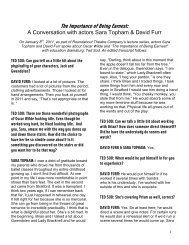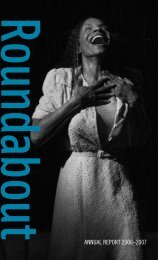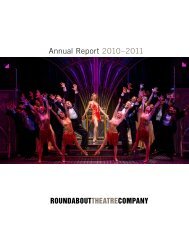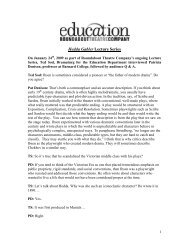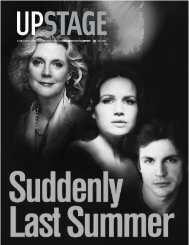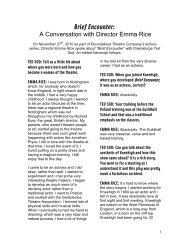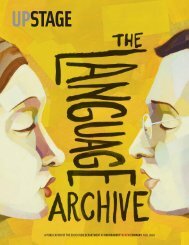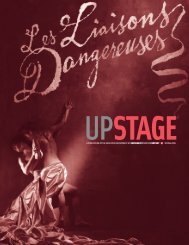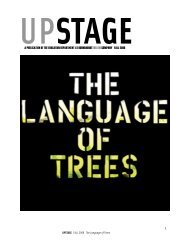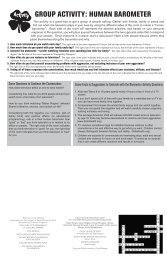Hedda Gabler - Roundabout Theatre Company
Hedda Gabler - Roundabout Theatre Company
Hedda Gabler - Roundabout Theatre Company
Create successful ePaper yourself
Turn your PDF publications into a flip-book with our unique Google optimized e-Paper software.
UPSTAGE<br />
A Publication of the Education Department at <strong>Roundabout</strong><strong>Theatre</strong><strong>Company</strong> UP WINTER2009<br />
UPSTAGE winter 2009 <strong>Hedda</strong> <strong>Gabler</strong> 1
PSYCHOLOGY–The study of the mind and mental processes,<br />
especially in relation to behavior.<br />
<strong>Hedda</strong>: Is there something<br />
I can help you with?<br />
Miss Tesman: No, no, no!<br />
<strong>Hedda</strong> Tesman must only<br />
have happy thoughts at a<br />
time like this<br />
<strong>Hedda</strong>: Happy thoughts? I<br />
can’t control my thoughts.<br />
2 ROUNDABOUTTHEATRECOMPANY
4<br />
The <strong>Roundabout</strong> <strong>Theatre</strong> <strong>Company</strong>’s production of <strong>Hedda</strong> <strong>Gabler</strong><br />
stars Mary-Louise Parker, Peter Stormare, and Michael Cerveris<br />
in this adaptation by Christopher Shinn. On the following pages<br />
are interviews with some of the actors as well as a section titled,<br />
“The World of The Play,” which provides more information about<br />
understanding Ibsen, his history, and his world.<br />
The Psychology of Acting: Mary-Louise Parker 4<br />
The Psychology of Directing: Ian Rickson 6<br />
6<br />
The Psychology of Ibsen: The World of the Play 8<br />
The Psychology of <strong>Hedda</strong>: The Women Who Have<br />
Played <strong>Hedda</strong> 10<br />
The Psychology of Adaptation: Christopher Shinn 12<br />
The Psychology of Costume Design: Ann Roth 14<br />
8<br />
The Psychology of Language: Vocabulary 15<br />
10 12 14 15<br />
upstage CONTRIBUTORS: Greg McCaslin Director of Education; Reneé Flemings Director of Instruction and<br />
Curriculum Development; Ted Sod Education Dramaturg; Jennifer DiBella Education Program Manager;<br />
Jay Gerlach Education Associate for <strong>Theatre</strong>-Based Programs; Amanda Hinkle Education Associate for School-Based<br />
Programs; Kayla Carpenter Education Intern; Emily Meagher Education Intern. COVER: Artwork for the <strong>Roundabout</strong> <strong>Theatre</strong><br />
<strong>Company</strong> production of <strong>Hedda</strong> <strong>Gabler</strong>. Production photos: Nigel Parry. Copyright © 2008 <strong>Roundabout</strong> <strong>Theatre</strong> <strong>Company</strong>, Inc.<br />
All rights reserved.<br />
ROUNDABOUTTHEATRECOMPANY 231 West 39th Street, Suite 1200, New York, NY 10018 Telephone: 212.719.9393 Fax: 212.869.8817 www.roundabouttheatre.org.
the<br />
PSYCHOLOGY<br />
of<br />
acting<br />
UPSTAGE sat down with Tony ® and Emmy® Award Winning actress<br />
Mary-Louise Parker to discuss the process of discovering <strong>Hedda</strong> <strong>Gabler</strong>.<br />
Why did you want to play the role of <strong>Hedda</strong><br />
<strong>Gabler</strong>?<br />
People asked me to do the play for a long time and<br />
I never felt inspired by it, but Todd Haimes got me<br />
excited about it. And then I spoke to Ian Rickson and<br />
Ian got me excited about it. And it just felt right. Some<br />
parts come along at the right time. And it just felt like a<br />
good idea at this time.<br />
Had you experienced the play on any level before?<br />
I studied Ibsen in school. I’ve seen one production of it.<br />
I have read it many times because people have asked me<br />
to do it. So I did know it, and I have a pretty good sense<br />
of it.<br />
I know you are in the middle of your process, but<br />
what have you been discovering about her?<br />
I think it’s sort of a bottomless part. There are days<br />
when I think, “What am I doing?” It’s like Nora in A<br />
Doll’s House. She comes so far in one play. Trying to<br />
figure out where she starts is the challenge. You can<br />
go a lot of different ways with Ibsen. It’s just trying to<br />
figure out how to be true to the play and also make it<br />
interesting for people to see it for the nineteenth time.<br />
Are you comfortable sharing your process?<br />
Not really. I’ve never really talked about it because some<br />
of it just goes through a metamorphosis and changes<br />
and some of it’s private and some of it is just boring<br />
for someone else. But I do try to make it fluid so that if<br />
people come in with a different process from my own I<br />
can learn from them. I’m not so set in my ways.<br />
You have worked in lots of different media. What<br />
is it that differentiates the media?<br />
<strong>Theatre</strong> is more work intensive, labor intensive. It<br />
requires more stamina. It requires more concentration.<br />
It requires a discipline. And film and television can be<br />
physically and emotionally draining because you have<br />
to get it for a moment and you have one shot at it. And<br />
if you don’t nail it in that shot, or if you don’t find<br />
something in that shot, or if you don’t surprise yourself,<br />
that’s it. That’s all you get. So you’re trying to stay in a<br />
place that’s sort of precarious. And it’s hard to maintain.<br />
Whereas with theatre you get another chance at it and<br />
it’s exhausting, but I think in a good way. I think you<br />
either love it and you get it or you don’t.<br />
You do theatre as much as you can.<br />
If I didn’t have children I would do theatre a lot more<br />
frequently. After I did Reckless it was probably three<br />
years before I did Dead Man’s Cell Phone. And that’s<br />
the longest break I’ve ever had and that was really hard.<br />
My son was at a certain age and I wanted to be able<br />
to put him to bed at night. Nothing ever stood in the<br />
way of theatre for me before. That’s the first time that’s<br />
happened. But luckily, it’s the kind of medium that I can<br />
do it as long as I can remember lines.<br />
Dead Man’s Cell Phone and Reckless can be<br />
considered contemporary plays. But what about<br />
classics?<br />
I’m not sure I’m really drawn to them anymore. I did a<br />
lot of classics early in my career when I first got out of<br />
school. I did Oscar Wilde, everything really. I felt like<br />
even the modern plays I was in I was wearing a corset<br />
for. I did this Terrence McNally play and I was like, “I’m<br />
in a corset again and it’s a modern play, it’s Terrence<br />
McNally you know?” So I just did a lot of that. And<br />
I just feel like for me generally I’m usually excited by<br />
a play that’s never been done before; words that have<br />
never been read or touched. With How I Learned to<br />
Drive I just felt like when I read it I didn’t really get it<br />
until I went to speak it. And it was the first time that it<br />
had ever been done; there were no preconceptions of<br />
it. It was the same with Proof, and Prelude and Babylon<br />
Gardens-- most of the plays I’ve done. So that’s more<br />
exciting for me generally.<br />
Can you tell me a little bit about what you look for<br />
in a director?<br />
Everything that Ian has really.<br />
He’s very sensitive.<br />
He’s so smart. He’s so dedicated, so open, generous. But<br />
it starts with his intellect. He really can converse on a<br />
number of different things on a number of different<br />
levels and he brings all of that into the room. He can<br />
access fifty things where somebody else may only be<br />
able to access five. When you work in film people draw<br />
comparisons, such as “Remember that scene in that<br />
movie…” and that just turns me off. I don’t want to<br />
hear an example from a movie. I want an example<br />
4 ROUNDABOUTTHEATRECOMPANY
from life or literature, or art. I don’t want to know how<br />
somebody did something in some Hitchcock film. I<br />
don’t care. Everything gets once removed that way. He’s<br />
a fleshed out, smart, humane person. He’s funny and<br />
he’s just great.<br />
Can we talk a little bit about Christopher Shinn’s<br />
adaptation?<br />
He’s so knowledgeable and has such a passion for it.<br />
And again he’s very sensitive and generous, and he’s<br />
worked so hard. When you do a translation it’s hard<br />
because you have people picking on every line. You have<br />
a Norwegian assistant saying this is this in Norwegian.<br />
And you have actors saying this and the director’s saying<br />
that. And he’s been so generous and gracious. And at the<br />
same time I really feel like he knows what he is doing;<br />
we’re just lucky to have him.<br />
Do you sense any particular challenge in this role<br />
yet?<br />
I think every page in this play is impossibly hard.<br />
Ibsen had an amazing mind especially when you<br />
think that he wrote <strong>Hedda</strong> over one hundred years<br />
ago.<br />
A Doll’s House too. He wrote two of the most crucial,<br />
iconic female protagonists of that century, and probably<br />
the next century, that have persevered until now. As you<br />
said, people are still fascinated with it and are out there<br />
trying to do it. Things don’t usually have that kind of<br />
staying power.<br />
He shook up the middle class.<br />
Yes, that’s true. I think there’s generally a judgment on<br />
a woman who is a protagonist no matter what. I think<br />
people don’t immediately go with her, they judge her<br />
first on different levels.<br />
I think we are a misogynistic culture in some ways.<br />
I do too.<br />
What type of advice do you give to people who<br />
tell you that they want to act or have a career like<br />
yours?<br />
Just don’t stop and don’t let anyone tell you who you<br />
should be. I feel like, in the end, everything that people<br />
responded to in my work was initially not liked by my<br />
teachers and in early auditions. They thought I was too<br />
strange or just off. I could never get a commercial. I<br />
wanted a commercial so badly because I thought of the<br />
residuals. And always, it was, you’re too strange, you’re<br />
too this, and in the end it’s just those things about you<br />
that will work for people one day if you keep going and<br />
just be true to yourself. Don’t listen when people tell<br />
you to get an architectural degree on the side because<br />
then you’ll be an architect.<br />
You went to North Carolina School of The Arts. Did<br />
you find that experience valuable?<br />
Oh yeah, because I had never really acted before so I<br />
would do anything. I was such a sponge. If they asked<br />
to do an exercise I’d be the first one up. I just wanted<br />
to eat it up; I wanted to do everything. I was such an<br />
awkward, shy kid in high school and when I got to<br />
college I just exploded. I found something and someone<br />
to be who was myself, who I had denied for so long.<br />
It was fantastic for me; I got to act all day long. And I<br />
thought, “Wow, maybe I’m good at something.” So that<br />
was awesome.<br />
I want to end by asking if there is a question that I<br />
didn’t ask that you wish I had asked.<br />
I think people should study if they want to be an actor.<br />
You should have some path of study, some language. I<br />
think just showing up and relying on your charm and<br />
your own personal instincts is…I’m sure it’s worked in<br />
the past and there are probably some awesome actors<br />
who do that, but I think it limits you in terms of what<br />
you can do, who you can work with, and what you can<br />
bring to the room. UP<br />
UPSTAGE winter 2009 <strong>Hedda</strong> <strong>Gabler</strong> 5
the<br />
PSYCHOLOGY<br />
of<br />
directing<br />
UPSTAGE recently interviewed director Ian Rickson and assistant director<br />
Sarah Cameron-Sunde to discover how they transformed <strong>Hedda</strong> <strong>Gabler</strong><br />
for a contemporary audience.<br />
Why did you want to direct <strong>Hedda</strong> <strong>Gabler</strong>?<br />
IR: Well, I think when you do a classic play it’s not<br />
enough that it’s a classic. You have to think, “Why is<br />
it purposeful and meaningful to do this play now?”<br />
I’ve spent a whole life only doing new plays. So I’m<br />
cautious about doing classic plays. But upon deep<br />
reflection on <strong>Hedda</strong> <strong>Gabler</strong>, I increasingly thought it<br />
was a very powerful, contemporary play to do because<br />
it’s complex, compelling, provocative and involving<br />
of an audience. First of all, Ibsen is critiquing what<br />
we’re living in now which is a culture of fear, based<br />
upon competition, based upon material wealth as<br />
validating of self. Ibsen’s critique of that culture and<br />
what it does to human beings is just brilliant. I think<br />
what the play’s doing in terms of its psychology is really<br />
modern. First of all, the play is really uncompromising<br />
about mortality and death. The first conversation that<br />
<strong>Hedda</strong> and her husband have is this meditation upon<br />
the yellow leaves and you feel this continual movement<br />
towards the meaning of death throughout, and indeed<br />
as we move through the play there are three deaths in<br />
quick succession in the fourth act. There are the deaths<br />
of Aunt Rina, of Løvborg, and <strong>Hedda</strong>. And I think a<br />
society that can be wrongly based upon the things I<br />
talked about earlier can try and hide death. Something<br />
about <strong>Hedda</strong> <strong>Gabler</strong> takes you by the scruff of the neck<br />
and makes you face death. I love this thing Saul Bellow<br />
said, “Death is the dark backing, that a mirror needs,<br />
if we are to see anything.” And I find there’s something<br />
about the play’s encounter with death, which again is<br />
sort of a gauntlet to an audience about how to live. Part<br />
of our humanity is connected to mortality. So those<br />
things particularly, those two aspects of the play, interest<br />
me greatly. I find some other Ibsen plays much more<br />
expositional and over-plotted but there’s something<br />
about the movement of <strong>Hedda</strong> that is orchestral, finely<br />
honed and invigorating.<br />
Why did you choose Christopher Shinn to do the<br />
adaptation?<br />
IR: For me, it was logical thinking, “Who are the really<br />
interesting, American playwrights? And who are the<br />
interesting American playwrights who would have an<br />
affinity with Ibsen?” Having produced four of Chris<br />
Shinn’s plays at The Royal Court <strong>Theatre</strong> I had a<br />
hunch that he would be responsive to the aesthetic and<br />
psychology of Ibsen, and he was. He teaches Ibsen and<br />
he reads Ibsen all the time.<br />
What do you think is the fascination with <strong>Hedda</strong>?<br />
Why do we want to see this woman?<br />
IR: It’s a woman complacent in her own victim-hood.<br />
And I think everyone can identify with that. We think,<br />
“Ah did I self sabotage there?” We are all social beings,<br />
so like <strong>Hedda</strong> we are trying to work out how we can<br />
be in a world that has that set of values. Mary-Louise<br />
Parker has such a compelling inner life, her immersion<br />
in the complex inner truths of the character is very<br />
moving, and she has all of the dualities of <strong>Hedda</strong>.<br />
She has a brittleness, she’s strong, she’s has a sort of<br />
tremulous quality and yet she’s very powerful. That’s a<br />
key thing. What do you think?<br />
SCS: She’s a very tricky character to figure out. There’s<br />
just a curiosity that you can think one thing about her<br />
at one moment and another thing five minutes later. I<br />
think theatre artists have a desire to go into that because<br />
that challenge is just…it’s confusing and yet it makes<br />
sense. It’s a challenging play to work on and that’s<br />
thrilling.<br />
Chris Shinn said he didn’t know whether the<br />
actress or you would buy into this, but he felt a<br />
lot of it had to do with her not ever accepting her<br />
father’s death.<br />
IR: All great plays are driven by loss, and I think<br />
that’s a good reading of the play. I think <strong>Hedda</strong> hasn’t<br />
probably grieved the loss of her mother which isn’t even<br />
mentioned in the play and then there’s the loss of her<br />
father and to a certain extent the loss of Eilert Løvborg.<br />
So she’s fraught with losses that she hasn’t been able to<br />
grieve, and that’s a very dangerous place to be. I think<br />
she probably feels guilty, shameful about those losses.<br />
She didn’t keep her father alive, she didn’t yield to<br />
Løvborg, and if her mother died in childbirth she killed<br />
her mother in some way. So if you feel <strong>Hedda</strong>’s pain and<br />
her capacity to love, the play works.<br />
How did you choose your design team and the rest<br />
of the cast? What were you looking for with both<br />
your designers and actors?<br />
6 ROUNDABOUTTHEATRECOMPANY
IR: I have the privilege as a director of thinking who<br />
are the best collaborators, “Oh there’s this lovely, young,<br />
half-Norwegian director who can assist me or there’s<br />
a set designer who I’ve worked with on The Seagull<br />
whose done lots of Ibsen and who I have a very good<br />
shorthand with and I know she will understand the<br />
sort of charged world of <strong>Hedda</strong> <strong>Gabler</strong>. And then I<br />
think that I don’t want it to feel like a polite period<br />
classic so maybe I can do some things that intervene in<br />
an embracing way. So P.J. Harvey is doing the music.<br />
Rebecca Habel, your colleague, said “What about Ann<br />
Roth for costumes?” “What about Natasha Katz for<br />
lighting?” So that was lovely and I’d like to articulate her<br />
egoless, subtle role in this.<br />
I wanted to get actors who are truthful, who go deep,<br />
who belong in this very heightened, intense world and<br />
who are going to challenge Mary-Louise Parker, who<br />
aren’t going to be overly respectful and passive and who<br />
are going to push her onstage. That’s what Mary-Louise<br />
wants. I think about all of that. Being a director is like<br />
having a big shopping bag and going to the market and<br />
thinking, “Okay I’ve got this recipe <strong>Hedda</strong> <strong>Gabler</strong>, how<br />
do we make it? That’s available in the market; let’s get<br />
some of that. I could use that. We could cook it in this.”<br />
It’s thrilling.<br />
I know you are a week or so into the process, have<br />
you already figured out the biggest challenge of<br />
directing this play?<br />
IR: It’s very challenging emotionally and psychologically<br />
because it doesn’t relent and it keeps propelling you<br />
into visceral deep dark human material. I find it very<br />
upsetting, the play.<br />
Can we talk a little bit about becoming a director? Any<br />
advice you might give to a person who wants a career<br />
like you have?<br />
IR: Well, the best way of becoming a director is to<br />
direct. I think it’s great to assist. It’s fine to do courses;<br />
it’s good to go to school. But really the only thing that<br />
speaks for you is your work. And I’m a great advocate of<br />
study, learning, reading, learning wherever you can from<br />
whoever you can, but really you’ve got to find a way<br />
of getting your work on and learning through doing it<br />
and getting other people to see it so they then employ<br />
you. You need tenacity and you need resilience, and<br />
you need robustness and you need some luck because<br />
financially it’s very difficult. But the big thing you need<br />
is your passion and desire for the medium. You’ve got to<br />
love the work, the collaborative nature of it, and a real<br />
mission; that it’s an important thing to do. That’s the<br />
thing that puts the petrol in the tank alongside all the<br />
other demanding things you need. This is true still for<br />
me in my forties.<br />
Did you want to say something?<br />
SCS: It’s about being aware and taking advantage of an<br />
opportunity when it comes your way and saying yes<br />
a lot to things in the beginning and then also finding<br />
something that you really care about. I agree with Ian<br />
about doing it. You have to direct. You have to work. My<br />
career started to take off when I started to find a writer<br />
who I was very passionate about bringing to the United<br />
States—who happens to be a Norwegian writer—and<br />
then being able to put my whole self into that because I<br />
cared about it so deeply and it worked. It gets attention<br />
and then there’s a niche or something that people<br />
know that you are good at and then you learn and you<br />
keep going and things change. Finding the writers and<br />
collaborators that you care about and that you work<br />
well with is so important.<br />
I wonder if you could talk about inspiration a little<br />
bit; what inspires you.<br />
IR: Largely from the collaborators, whoever they are;<br />
it could be a costume assistant, the actors, from the<br />
work itself. The fact that Ibsen could make this thing is<br />
inspiring. It feeds you. But I take inspiration from life;<br />
the complexities and vicissitudes of life. Talking to some<br />
teacher who is working hard or a conversation in the<br />
street is inspiring. I think that as an artist you have to be<br />
open, hungry, and curious. And that’s what inspiration<br />
comes from quite often.<br />
Is there anything I didn’t ask that I should have?<br />
IR: No, those were great questions.<br />
SCS: I had one. I just want to touch on the importance<br />
on having an American adaptation of this play because<br />
I talk a lot about translation. I think we’re expected<br />
to understand and fully get British translations of<br />
plays and those just don’t resonate in the same way for<br />
American actors or the American audience. I think it’s<br />
incredibly exciting that Ian chose Chris Shinn to do this<br />
because I think language is the starting point of a play.<br />
I just want to commend the <strong>Roundabout</strong> for actually<br />
going for that. UP<br />
Paul Sparks, Mary-Louise Parker and Ann Reeder in <strong>Hedda</strong> <strong>Gabler</strong><br />
UPSTAGE winter 2009 <strong>Hedda</strong> <strong>Gabler</strong> 7
the<br />
PSYCHOLOGY<br />
The World of the Play<br />
of<br />
Ibsen<br />
They married in 1858 and their only child, Sigurd,<br />
was born in 1859. After the Norwegian <strong>Theatre</strong> went<br />
bankrupt and his plays failed to receive the recognition<br />
deserved he decided to go abroad. He spent the next<br />
twenty-seven years traveling, living primarily in Italy<br />
and Germany. It was during this time that Henrik Ibsen<br />
wrote his most famous plays.<br />
Ibsen believed in youth and the future rather<br />
than societal norms. His plays include “emotionally<br />
bankrupt” characters who deal with issues such as<br />
sexually transmitted diseases, unhappy marriages, and<br />
unwanted pregnancies. Ibsen’s plays caused as much<br />
outrage as they did excitement. Ibsen wrote his last play,<br />
When We Dead Awaken in 1899. In 1900 he suffered<br />
the first of many debilitating strokes that left him with<br />
severe mental illnesses. He died on May 23, 1906.<br />
Henrik Ibsen<br />
Henrik Johan Ibsen was born in Skien, Norway, on<br />
March 20, 1828. His father, Knud Ibsen, was a wealthy<br />
merchant and his mother Marichen Cornelia Martine<br />
Altenburg was a painter who enjoyed all arts. Ibsen<br />
and his family lived a very comfortable, social life until<br />
1835 when Ibsen’s father went bankrupt. Young Henrik<br />
Ibsen’s dreams of becoming an artist were put on hold<br />
and at the age of fifteen he was forced to take on an<br />
apprenticeship with a pharmacist. In 1850 he set out<br />
for the city of Christiania, which is now Oslo, and tried<br />
to pursue a degree in medicine. He quickly realized that<br />
becoming a doctor was not what he wanted and instead<br />
turned to the world of the arts. He began to write for<br />
the theatre. His first play, Catiline, was published in<br />
1850. In 1851 he took the post of “theater-poet” for the<br />
Bergen National Theater. With this appointment he was<br />
able to fully delve into his writing and into the world<br />
of Norwegian theatre. During this time, he was able to<br />
stage over 150 plays and became acquainted with the<br />
mechanics of professional theatre. With these new skills<br />
under his belt he was able to take on the post of artistic<br />
director of the Norwegian <strong>Theatre</strong> in Christiania. It was<br />
here that he met his wife Suzannah Daae Thørensen.<br />
Henrik Ibsen and Realism<br />
Before Henrik Ibsen, theatre of the time period<br />
were largely melodramas which were overplayed, bawdy<br />
dramas that had no depth and no inner conflict relying<br />
highly on spectacle. They usually centered on a villain<br />
dressed in black who would do some horrible thing and<br />
the perfect hero would come in and usurp the villain<br />
and save the hapless girl that the villain had stolen away.<br />
When Henrik Ibsen began writing his plays in 1850<br />
he inspired an entire movement of theatre, one that<br />
scholars consider to be the beginnings of modernism in<br />
8 ROUNDABOUTTHEATRECOMPANY
Realism<br />
• Tried to make plays as honest to everyday life<br />
as possible.<br />
• Did not include soliloquies or asides that were<br />
addressed to the audience<br />
• Dialogue was written as brief and overlapping<br />
as normal speech.<br />
• The language had a second meaning<br />
underneath.<br />
• Playwrights did not break the “fourth wall.”<br />
• Plays were supposed to supply a means for<br />
discussion and contemplation.<br />
• Endings of these plays often left the plot points<br />
unresolved.<br />
• The playwrights chose to write characters that<br />
had deep inner conflict.<br />
theatre; this movement is called Realism.<br />
Realism often touched on the parts of life that<br />
could be considered ugly or distasteful; topics that<br />
included things that Victorian society rarely spoke of in<br />
the privacy of their own homes, let alone in the public<br />
setting of the theatre. Henrik Ibsen embraced this view<br />
wholeheartedly and wrote all of his plays to include<br />
subject matter deemed largely inappropriate by many<br />
theatre-goers.<br />
Most of the “heroes” of his plays dealt largely with<br />
going against the social and moral systems put forth by<br />
society. Ibsen often liked to make the audience question<br />
which characters were really in the right. Ibsen once<br />
stated, “In the good there is bad, and in the bad there is<br />
good.” Ibsen wanted his audience to walk away not sure<br />
of who really was the true hero.<br />
Ibsen, Women, and Victorian Values<br />
Women in Ibsen’s plays are often used to showcase<br />
his ideas of modernity and how Victorian values are<br />
not in the best interests of anyone. At this time, moral<br />
standards were held in the highest of regard within<br />
the middle and upper classes. What people did and<br />
didn’t do was based upon the question, “Is it proper?”<br />
Women of the Victorian age (so named after Queen<br />
Victoria of England) had a very particular position in<br />
society. Women were to be seen and not heard. They<br />
were first their father’s property and after marriage<br />
their husband’s. All mention of emotions and anything<br />
dealing with sexuality was expressly forbidden. An<br />
unmarried woman needed a chaperone with her at<br />
all times to save her from being described as a soiled<br />
woman with a sordid past. Because it was deemed<br />
inappropriate for a woman to make her own money,<br />
the only way for her to be supported would be to marry.<br />
If women did not marry at a young age they were<br />
considered a lesser member of society and often became<br />
destitute unless a family member would graciously take<br />
them in. In this time period, a woman who put herself<br />
first was considered an outcast and would often not<br />
be accepted by her own family. Ibsen wrote many of<br />
his heroines as women who stood up for themselves;<br />
women who did not do what their husband or society<br />
thought was proper. Ibsen believed domesticity to be a<br />
chain around women’s necks. It stifled them and took<br />
away their right to be people; their right to live. Because<br />
of Ibsen’s resistance to the Victorian belief structure,<br />
some scholars state that Henrik Ibsen was one of the<br />
most profound feminist writers of his time.<br />
UPSTAGE winter 2009 <strong>Hedda</strong> <strong>Gabler</strong> 9
the<br />
PSYCHOLOGY<br />
of the<br />
<strong>Hedda</strong><br />
What those who have played the role of <strong>Hedda</strong> <strong>Gabler</strong> in the past have to say<br />
about one of the theatre’s most iconic women.<br />
Martha Plimpton: <strong>Hedda</strong> is “a human being who is<br />
terrified and has no tools to deal with her terror. Only<br />
a person of experience and maturity is supposed to be<br />
able to do it properly. That may be true on a certain<br />
level, but it can also make the play a little heavy.” 1<br />
Kate Burton: “<strong>Hedda</strong> <strong>Gabler</strong> is so much of her time.<br />
So much of what she is dealing with is being a woman<br />
in that society, being repressed in not having the<br />
opportunities that men had, not being able to follow<br />
a career. As the only child, both daughter and son, of<br />
the general, everything she loves–guns, horses–were<br />
virtually male.” 3<br />
Judith Light: <strong>Hedda</strong> is “a mythic and iconic figure, a<br />
woman who has a great deal of talent and nowhere to<br />
put it, who is not a mother figure and who has no grace<br />
or gentility. Every time she had a choice, she chose to go<br />
in the darker direction.” 2<br />
Annette Bening: “Most women would say they relate<br />
to <strong>Hedda</strong> <strong>Gabler</strong>–there’s a part of her in them. Ibsen was<br />
writing about a deep ambivalence that many women<br />
feel about domesticity. I think about myself and friends<br />
of mine–we have some of <strong>Hedda</strong>’s qualities and traits.” 4<br />
1 ARTS IN AMERICA; Onstage, <strong>Hedda</strong> <strong>Gabler</strong> was anti-heroine of the year. Stephen Kinzer. New York Times, December 26, 2001.<br />
2 Ibid.<br />
3 Actress likens ‘<strong>Hedda</strong>’ to a female Hamlet. Iris Fanger. The Christian Science Monitor, January 19, 2001.<br />
4 Discovering the Modern Ties In a Corsetted Ibsen Creation. Bernard Weinraub. New York Times, March 14, 1999.<br />
10 ROUNDABOUTTHEATRECOMPANY
Cate Blanchett: If you don’t understand the choice<br />
that she’s made by marrying Tesman, then you don’t<br />
really understand <strong>Hedda</strong>. There’s a line where she<br />
actually has lofty ambitions to get Tesman into politics,<br />
and she says, ‘Do you think he could be the prime<br />
minister?’ And it’s absolutely ludicrous” 5<br />
Claire Bloom: “I had wanted to do a modern woman<br />
and nothing could be more modern then either of these<br />
two roles I realized finally. Both <strong>Hedda</strong> and Nora [from<br />
Ibsen’s A Doll’s House] are incredibly alive and modern<br />
in spirit. They’re both rebels, frustrated by circumstance<br />
and all this was long before the women’s liberation<br />
movement.” 8<br />
Ingrid Bergman: “I think that the play is outstanding<br />
and there is so much more that I would like to know<br />
about this woman. I have still not really acquired a<br />
proper grasp of her. I would like to play her for the<br />
theatre” 6<br />
Blanche Yurka: “I had some ideas about <strong>Hedda</strong> which<br />
were somewhat at variance with the interpretations I<br />
had seen. Almost always played as the embodiment of<br />
evil from the start, she usually became a ruthless witch,<br />
from whom Tesman would, in my opinion, have fled in<br />
terror. But I saw her rather differently: as a woman of<br />
potentially forceful character who, in another era, given<br />
an outlet for her energies, might have been a vital and<br />
entertaining member of society; moreover, one whose<br />
humour would have certainly been a distinct social asset<br />
among the sophisticates of today. But <strong>Hedda</strong>’s restless<br />
energies were not viable in the society in which she<br />
lived; they festered and eventually destroyed her.” 9<br />
Janet Suzman: “The brilliance of the character is that<br />
like Hamlet, it’s a distillation of Western dissatisfactions,<br />
but unlike Shakespeare, she doesn’t have huge speeches.<br />
That makes her a more mysterious voice. It’s immensely<br />
private. She has great silent soliloquies, like the scene<br />
where she burns Løvborg’s manuscript, in which so<br />
much of her character is revealed.” 7<br />
5 <strong>Hedda</strong> Steam. Cate Blanchett on Ibsen´s female Hamlet—a role she was dragged into ‘a bit kicking and screaming´. Matt Dobkin. New York Magazine, February 19, 2006.<br />
6 Ingrid Bergman og Alan Burgess, Ingrid Bergman: Mitt liv, Anne-Marie Smith (overs.), Aschehoug, Oslo 1981, s. 386.<br />
7 The housewife heroine. David Bendict. The Independent (London), August 2, 1996.<br />
8 Claire Bloom to Apear in Ibsen Pays. Howard Thompson. New York Times, August 21, 1970.<br />
9 “Acting <strong>Hedda</strong> <strong>Gabler</strong>” in Bohemian Girl: Blanche Yurka’s Theatrical Life Athens, Ohio: Ohio University Press, 1970<br />
UPSTAGE winter 2009 <strong>Hedda</strong> <strong>Gabler</strong> 11
the<br />
PSYCHOLOGY<br />
of<br />
adaptation<br />
UPSTAGE Recently Spoke with Christopher Shinn About His Adaptation of <strong>Hedda</strong><br />
<strong>Gabler</strong> and his affection for Henrik Ibsen’s work.<br />
What made you decide to adapt <strong>Hedda</strong> <strong>Gabler</strong>?<br />
I was asked and I decided to accept because Ibsen is my<br />
favorite playwright and I really relished the opportunity<br />
to convey his work in a way that was true to him but<br />
also revising it for an audience in 2009.<br />
Tell me a little bit about your affection for Ibsen’s<br />
work.<br />
When I was fifteen I saw a production of The Master<br />
Builder at Hartford Stage with Sam Waterston and<br />
Cynthia Nixon. That was in 1991 and I was really<br />
shocked by it. I’d never seen a play that dealt so<br />
forthrightly with difficult and unacceptable feelings and<br />
impulses. And then later that year we read <strong>Hedda</strong> <strong>Gabler</strong><br />
out loud in my English class and similarly I was really<br />
scandalized to see such primitive emotions represented<br />
so directly. I found it threatening, subversive, and<br />
exciting. I felt that Ibsen was dramatizing things that<br />
existed that no one ever talked about. So that’s really<br />
where it began for me. I remained interested in Ibsen<br />
all throughout my late teens and early twenties. But<br />
it wasn’t until 2002 or 2003 that I revisited Ibsen in<br />
a really serious, deep and sustained way and I think<br />
unconsciously I was looking to deepen my own<br />
writing and to get in touch with deeper parts of myself.<br />
So I went back and began reading his prose plays<br />
chronologically. Then in 2004 or 2005, at the New<br />
School for Drama, where I teach in the MFA program,<br />
I decided to teach the plays to my graduate students in<br />
chronological order so I could show the growth of a<br />
writer, the development, the changes, the similarities,<br />
what sustained over those twelve plays. And I would<br />
say at that point, I just became much more personally<br />
affected by the honesty and uncompromising selfexamination<br />
of his work. I began reading his plays<br />
repeatedly, year after year, so when I was called about<br />
adapting <strong>Hedda</strong> I was still in the midst of a profound<br />
engagement with Ibsen’s work so the timing was really<br />
perfect.<br />
Do you subscribe to the belief that Ibsen is the<br />
father of modern drama?<br />
I think Ibsen and Chekhov had such a profound impact<br />
that’s still being felt today. I think a lot of major writers<br />
are following these two major writers. I think Ibsen<br />
was slightly more radical then Chekhov, so we’ve seen<br />
Chekhov be a little more influential in our time than<br />
we’ve seen Ibsen be. But I think undoubtedly, Ibsen was<br />
an influential writer. Certainly, he was one of the two<br />
essential playwrights that impacted 20 th century drama.<br />
Do you see your work as a translation or an<br />
adaptation? How do you define it?<br />
To call it a translation you have to speak the language<br />
and I don’t speak the language. I think both Joyce and<br />
Freud learned the language because they so loved Ibsen.<br />
They learned the language in order to read the original<br />
which I always found extraordinary. Unfortunately, I<br />
cannot say this of myself, so I’ll call it an adaptation<br />
because I’ve had to rely on a literal translation from<br />
somebody else.<br />
So how do you start working on an adaptation<br />
with a play as, I’ll use your word, as profound as<br />
<strong>Hedda</strong>?<br />
I can tell you how I literally began. . I basically tried to<br />
immerse myself in the world of the play, in Ibsen’s life,<br />
and in academic and psychoanalytic writing about the<br />
play. I read probably 20 different adaptations of the<br />
play to see how other writers had done it, basically just<br />
to learn more and more about the play. I downloaded<br />
from the internet maybe 20 or 30 academic articles on<br />
Ibsen and <strong>Hedda</strong> <strong>Gabler</strong>. You know there’s a journal<br />
that’s devoted to Ibsen that’s published? So I saw the<br />
current academic writing about Ibsen. I read extensive<br />
biographical material about Ibsen. I read a lot of<br />
psychoanalytic articles about Ibsen. I read the literal<br />
translation. But all that was an attempt to understand<br />
what I felt about the play. Because I felt this is not an<br />
intellectual exercise, doing an adaptation, it has to<br />
come from deep inside of you. I think the audience will<br />
perceive if this is something you did in the library or<br />
if this is something you did feeling from the depths of<br />
your soul what was happening to these characters. So<br />
everything I did before I began writing was an attempt<br />
to know how I feel about the play as deeply as possible.<br />
So that’s how I prepared; that’s how I began.<br />
It sounds very extensive and I find it interesting<br />
because I read an article about you in reference to<br />
your play Dying City and the interviewer asked you<br />
if there was another career you ever considered<br />
and I believe you said psychoanalyst. Can we talk<br />
a little bit about <strong>Hedda</strong>’s psychology? What do you<br />
make of her?<br />
12 ROUNDABOUTTHEATRECOMPANY
Well I think my job, first and foremost, as an adapter,<br />
was to create something that would allow an actress<br />
and a director to go as deep as they could and to give<br />
them as many options and as much flexibility as the<br />
text allows. His text is so open; there are so many way<br />
to interpret it. So I wanted to make sure I wasn’t closing<br />
down any avenues of interpretation in what I did just<br />
because of what I felt. What I feel about <strong>Hedda</strong> is<br />
different than what I tried to do as an adapter. I thought<br />
about her primarily as someone who had never been<br />
able to face the loss of her father. There’s very little in<br />
the play that we hear about her father but it seemed<br />
to me that the play was infused with the disavowed or<br />
frozen grief or mourning that had never taken place and<br />
that this fact was something that profoundly defined<br />
<strong>Hedda</strong> <strong>Gabler</strong>’s psychology.<br />
Isn’t there a portrait of her father in the house?<br />
Well Ibsen’s stage directions indicate that but because<br />
no one ever refers to it in the text of the play it’s<br />
certainly something the director may choose to include<br />
or exclude. But I think one very key signifier is that<br />
<strong>Hedda</strong>’s married name is actually <strong>Hedda</strong> Tesman but<br />
the title of the play is <strong>Hedda</strong> <strong>Gabler</strong>. It’s easy to overlook<br />
because it’s the title and we know it and it’s familiar to<br />
us but of course what’s glaring about the title is that<br />
Ibsen gives her the last name of her father, not the last<br />
name of her husband, as if she’s married to her father<br />
or she’s never been able to actually move from the role<br />
of daughter to wife. So there’s a very strong hint that<br />
<strong>Hedda</strong>’s very entwined with her father. The portrait is<br />
something that is really for a director to decide whether<br />
they want it or not but the title is something that can’t<br />
be altered and that issues a strong signal of how central<br />
Ibsen thought the dead father was to the play.<br />
And they refer to her as General <strong>Gabler</strong>’s daughter<br />
if I remember correctly.<br />
Early in the play she is referred to in that way; she also<br />
refers to her father’s pistols. There are little moments<br />
where we’re reminded that she is the daughter of<br />
General <strong>Gabler</strong>.<br />
Are there any radical departures from what Ibsen<br />
wrote or from other adaptations that we should be<br />
aware of in your version?<br />
Ibsen was a writer who desperately wanted to speak to<br />
the people of his time. And so I imagine he would want<br />
an adaptation of <strong>Hedda</strong> <strong>Gabler</strong> to speak to an audience<br />
in America in 2009 and not to an audience in 1890’s<br />
Norway. So I felt like any changes we make that help<br />
the play feel relevant…they may be radical changes in<br />
a certain sense, but not if you look at how passionate<br />
Ibsen was about speaking to his time. So I would say<br />
anything I’ve done that’s different from what Ibsen did<br />
was done with the intent of doing what Ibsen wanted to<br />
do-- reach his audiences, speak to them.<br />
He certainly wanted to say things to the middle<br />
class that hadn’t been said before. And I would<br />
say our audience is mostly middle class. It’s<br />
fascinating. I know again from an interview you did<br />
that you were acutely aware of class differences<br />
growing up so I think it’s interesting that you are<br />
trying to find the spirit of what he wanted to do.<br />
Did you have to familiarize yourself with Mary-<br />
Louise’s work at all?<br />
Well I knew her stage work very well. It was refreshing<br />
to be writing the adaptation with her in mind, knowing<br />
she’d be saying the lines, as opposed to a generic <strong>Hedda</strong><br />
<strong>Gabler</strong> in my head or a different actress; I had a very<br />
strong sense of her. I hadn’t met her so I didn’t know<br />
what her thoughts about the part were. But I could<br />
imagine her saying the words so that definitely had an<br />
impact on me. You always want to write for an actor<br />
if you have the opportunity. So the rewrites that I’m<br />
doing right now in rehearsal, there’s nothing wrong<br />
with the lines, how I’ve written them, but once you get<br />
a real actor there it sometimes works better in a slightly<br />
altered way. It just fits that particular actor better. So<br />
right now I’m making sure, is making sure the text fits<br />
the actors as well as it can. So it’s a great gift to be able to<br />
make sure the adaptation fits with the actual production<br />
that we have.<br />
Christopher, I wanted to ask you two more<br />
questions. Are you inspired by any other writers?<br />
I know obviously you love the work of Ibsen, but<br />
what inspires you now?<br />
Well because I write for the theatre I find most of my<br />
inspiration in other playwrights, or else great thinkers<br />
of the age, philosophers and psychoanalysts. In Ibsen’s<br />
time there weren’t psychoanalysts but there were<br />
philosophers who were writing about the theatre world.<br />
So I find quite a lot of inspiration from those realms as<br />
well as the theatre.<br />
What kind of advice would you give to a young<br />
person, say someone from high school, who<br />
wanted to be a writer?<br />
My advice is always the same. You have to read<br />
extensively in all areas. That’s number one. Number two,<br />
you have to work incredibly hard on your writing. You<br />
have to devote immense amounts of time and effort<br />
to it. And three, you have to take good care of yourself<br />
both physically and mentally. You can’t do drugs. You<br />
can’t drink to excess. Those are all hard in their own<br />
way and were a struggle for me at one time. But I know<br />
that the more I’ve read and the harder I’ve worked, the<br />
better my work has become and the more successful I’ve<br />
become. So that’s always my advice. All three of those<br />
boil down to hard work; that’s my advice. UP<br />
UPSTAGE winter 2009 <strong>Hedda</strong> <strong>Gabler</strong> 13
the<br />
PSYCHOLOGY<br />
of<br />
design<br />
UPSTAGE discusses the process of designing costumes for film, theatre, and<br />
<strong>Hedda</strong> <strong>Gabler</strong> with designer Anne Roth.<br />
What is your process when approaching a play like<br />
<strong>Hedda</strong> <strong>Gabler</strong>?<br />
I read the play several times and some notes of Ibsen<br />
about <strong>Hedda</strong> specifically. I wanted it to have an Oslo<br />
quality. So I started looking at photographs of Oslo in<br />
that period. It’s a small city; I haven’t been there. I tried<br />
to imagine a social strata in that period, in that kind of<br />
setting. What the lighting is. I always like to think of the<br />
music of the period and the weather of the period, the<br />
furniture. I think about what it’s like when <strong>Hedda</strong> gets<br />
off the boat after a six month honeymoon and they’re<br />
not rich.<br />
I always have to figure out that when anybody gets<br />
into bed at night where do their clothes go? Are they<br />
tucked? Are they thrown on the floor? Do they get<br />
hung? There are no closets in that period. What do they<br />
do with them? Does the Judge have a maid or servant<br />
who removes them? That determines everything. Who<br />
makes them? Is there a tailor? Is there a shirt maker?<br />
Tesman has been on the road for six months, who does<br />
his laundry? If you listen to those ideas in your mind,<br />
you really can’t go wrong because they are the truth.<br />
Is a color palette emerging?<br />
It is. The scenery is pretty much<br />
unadorned because they have<br />
literally just moved into the house<br />
so there wouldn’t be any pictures<br />
on the walls, at least I don’t<br />
think so. And there wouldn’t be<br />
any doilies on chairs; in fact, it’s<br />
almost a bare room. And I’m not<br />
positive, but I’m pretty certain the<br />
colors of the walls are gray-green.<br />
I just did my colors around that.<br />
What do you make of this<br />
play? How does it affect you?<br />
The truth is that I adore great<br />
writing. And when I say great<br />
writing I mean really good<br />
writing. I can smell a badly<br />
written play. A long time ago, a<br />
very famous actor said to me, and<br />
I simply can’t tell you who, he<br />
said, “Give me Ibsen and I’ll give<br />
you a long nap.” Somebody else said to me, I don’t know<br />
who it was, “<strong>Hedda</strong> <strong>Gabler</strong>’s the greatest; it’s a great,<br />
great play and A Doll’s House is a great, great play,” and<br />
I said, and this was a long time ago, “Yeah, yeah, yeah.”<br />
And then I read this version and I must have read it<br />
three times in a very short period, and I realized that it<br />
really is a wonderful, wonderful play. And I think Ian<br />
has the same feeling I have about it.<br />
You’ve been away from the theatre doing film…<br />
I haven’t returned to theatre in almost two years. I’ve<br />
done three or four pictures last year. I did Mamma Mia!,<br />
The Reader, Doubt and I did a picture called Julie and<br />
Julia which they are now telling me won’t come out<br />
until the summer; but it’s divine.<br />
So talk to me about the difference between stage<br />
and screen. Is there a big difference?<br />
Yes, there’s a lot of difference. My mentality is now, I<br />
would say, film. If I’m looking for the right wedding<br />
ring for <strong>Hedda</strong> I might as well not spend any time doing<br />
it because you can’t see it.<br />
So really it’s a matter of detail.<br />
Well, yes, I would say; it’s the scale.<br />
What advice do you give to a young person who<br />
might want to do the type of work you do?<br />
It’s two lifetimes and it’s a lot of study. First of all<br />
you have to have a strong desire to put your vision<br />
on the stage. Your vision must be yours and you have<br />
to develop your own. There are ways to do that. For<br />
instance, as a child you are attracted to certain things.<br />
You find a beetle that is bronze and gold and it’s dead<br />
and you fall in love with this gorgeous thing. I’m talking<br />
of myself of course. I put it in a shoebox and maybe ten<br />
weeks later you come across something else you find<br />
utterly gorgeous and you have this little box of treasures<br />
that is specifically yours and you stick it under your bed.<br />
And then you go to school and you go to California to<br />
work and you come back and you pull this thing out<br />
from under the bed and it’s like a mirror of yourself. UP<br />
14 ROUNDABOUTTHEATRECOMPANY<br />
Helen Carey and Mary-Louise Parker in <strong>Hedda</strong> <strong>Gabler</strong>
the<br />
PSYCHOLOGY<br />
of<br />
language<br />
Vocabulary<br />
Villa–the rural or suburban residence of a wealthy person<br />
Verandah–the rural or suburban residence of a wealthy<br />
person<br />
Tyrol–is a region in Western Central Europe, which<br />
included the present day Austrian state of Tyrol, the<br />
Italian region Trentino-Alto Adige/Südtirol and three<br />
communes of the Italian region Veneto.<br />
Colleague–an associate in a profession or in a civil or<br />
ecclesiastical office<br />
Repulsive–arousing aversion or disgust<br />
Ghastly–intensely unpleasant, disagreeable, or<br />
objectionable<br />
Diligent–characterized by steady, earnest, and energetic<br />
effort<br />
Abstract–expressing a quality apart from an object<br />
Contorted–to twist in a violent manner<br />
Frivolously–lacking in seriousness<br />
Aptitude–capacity for learning<br />
Paltry–meager, measly<br />
Engrossed–to take or engage the whole attention of<br />
Brenner Pass–is a mountain pass through the Alps along<br />
the border between Italy and Austria<br />
Contemptuous–manifesting, feeling, or expressing intense<br />
dislike for someone or something.<br />
Amicably–neighborly, friendly<br />
Fisticuffs–a fight with the fists<br />
Delirium–an acute mental disturbance characterized<br />
by confused thinking and disrupted attention usually<br />
accompanied by disordered speech and hallucinations<br />
Resources<br />
Bloom, Harold, ed., Henrik Ibsen. Philadelphia: Chelsea<br />
House Publishers, 2000.<br />
Bloom, Harold, ed., Modern Critical Views: Henrik<br />
Ibsen. Philadelphia: Chelsea House Publishers, 1999.<br />
Lebowitz, Naomi, Ibsen and the Great World. Baton<br />
Rouge: Louisiana State University Press, 1990.<br />
Lyons, Charles, <strong>Hedda</strong> <strong>Gabler</strong>: Gender, Role and World.<br />
Boston: Twayne’s Masterwork Studios, 1991.<br />
Moi, Toril, Henrik Ibsen and the Birth of Modernism: Art,<br />
Theater, Philosophy. Oxford: Oxford University Press.<br />
Shaw, George Bernard, The Quintessence of Ibsenism.<br />
New York: Dover Publications, 1904.<br />
Peter Stormare and Mary-Louise Parker in <strong>Hedda</strong> <strong>Gabler</strong><br />
UPSTAGE winter 2009 <strong>Hedda</strong> <strong>Gabler</strong> 15
Activities to Explore the Psychology of <strong>Hedda</strong> <strong>Gabler</strong><br />
Before you see the show:<br />
How would you define a woman’s role in Norway in the<br />
1890’s?<br />
s What is expected of women? (The World of The Play<br />
section of this study guide offers some insights about the<br />
environment of the play.)<br />
s Think about times in your life thus far when you felt you<br />
had to compromise your sense of yourself in order to<br />
satisfy expectations placed upon you by society.<br />
s What were those expectations?<br />
s How did you compromise your sense of yourself?<br />
s How does your gender affect expectations placed upon you<br />
as an individual?<br />
As you watch the show:<br />
What are some of the choices the actor’s make to<br />
demonstrate their character’s desires?<br />
sWhat does <strong>Hedda</strong> want? How can you tell?<br />
s Why do you think <strong>Hedda</strong> moves the furniture so<br />
frequently?<br />
sWhy do you think the mirror situated the way it is on<br />
the set?<br />
After the show:<br />
Revisit the conflict between the desires that were important<br />
to <strong>Hedda</strong> and the expectations and pressure she felt<br />
throughout the play.<br />
Choose one of the following activities to complete:<br />
s Write an essay identifying the similarities and differences<br />
between Thea and <strong>Hedda</strong>. Include how those are<br />
represented metaphorically as well as literally.<br />
s Write a monologue from <strong>Hedda</strong>’s perspective speaking to<br />
her husband about what you believe to be her dreams or<br />
desires.<br />
s There are a number of events that occur off stage. Based<br />
on your understanding of the conflicts, desires and social<br />
restraints of the time, work in a group to write a short play<br />
that includes scenes not seen on stage.<br />
Example: a moment from the wedding trip, the scene<br />
between Jørgen and Løvborg after he has read the book<br />
to Tesman, the scene with the police and Løvborg.<br />
s Create a visual rendering (a drawing, collage, or painting)<br />
that illustrates <strong>Hedda</strong>’s conflict as you understand it after<br />
seeing the production.<br />
Send your work to <strong>Roundabout</strong>, and we’ll<br />
share it with the artists who created<br />
<strong>Hedda</strong> <strong>Gabler</strong>.<br />
Mail to: Education Department<br />
<strong>Roundabout</strong> <strong>Theatre</strong> <strong>Company</strong><br />
231 West 39th Street, Suite 1200<br />
New York, NY 10018<br />
Or email to: education@roundbouttheatre.org<br />
Mary-Louise Parker and<br />
Paul Sparks in <strong>Hedda</strong> <strong>Gabler</strong><br />
<strong>Roundabout</strong> <strong>Theatre</strong> <strong>Company</strong> gratefully acknowledges the following for their generous support<br />
of our education program:<br />
American Airlines<br />
The Aeroflex Foundation<br />
American <strong>Theatre</strong> Wing<br />
Axe-Houghton Foundation<br />
Rose M. Badgeley Residuary<br />
Charitable Trust<br />
Bank of America<br />
Theodore H. Barth Foundation<br />
Books of Wonder<br />
The Center for Arts Education<br />
CIT<br />
Citi Foundation<br />
Con Edison<br />
Ford Motor <strong>Company</strong><br />
The Heckscher Foundation for<br />
Children<br />
The McGraw-Hill Companies<br />
Mellam Family Foundation<br />
Newman’s Own Foundation, Inc.<br />
New York City Council Member<br />
Oliver Koppell<br />
New York City Department of Cultural<br />
Affairs<br />
New York State Council on the Arts<br />
The New York Times <strong>Company</strong><br />
Foundation<br />
George A. Ohl, Jr. Trust<br />
The Picower Foundation<br />
Richmond County Savings<br />
Foundation<br />
The Rudin Foundation<br />
Adolph and Ruth Schnurmacher<br />
Foundation<br />
The Honorable José M. Serrano<br />
The Starr Foundation<br />
State of New York Department<br />
of State<br />
The Michael Tuch Foundation, Inc.<br />
Verizon Communications<br />
The Walt Disney <strong>Company</strong>



